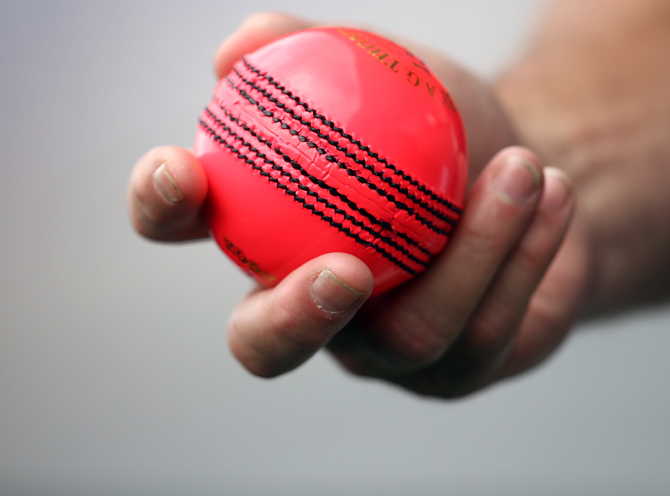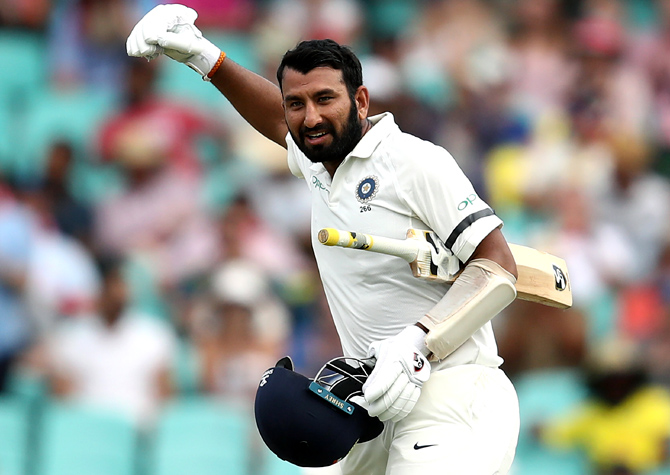'Getting used to the lights and the pink ball, especially early on, is the key.'

Another exciting chapter is set to unfold in the glorious history of Indian cricket.
Virat Kohli's Indian side will play the country's first-ever day-night Test, featuring the pink ball, against Bangladesh at the Eden Gardens in Kolkata later this month.
India have so far shied away from the pink ball experiment, but newly elected BCCI President Sourav Ganguly convinced the team to embrace the challenge as he bids to attract more fans towards the five-day format.
India and Bangladesh are the only Test nations that have not played a pink ball Test, with 11 matches played since 2015.
The first pink ball day-night game in India was played in 2016 -- the CAB Super League final between Mohun Bagan and Bhowanipore Club in Kolkata.
Later that year, the BCCI experimented with the pink ball during the 2016-2017 Duleep Trophy in Noida.
After not so encouraging feedback from the players, the pink ball experiment was relegated to the backburner.
India's batting mainstay Cheteshwar Pujara though had a ball batting against the pink ball as he hit a double century and a hundred in the three matches he played for India Blue.
"Once you play more matches with the pink ball you start understanding when the ball is swinging, when it stops swinging, when there is more help for the bowlers," Pujara tells Rediff.com's Harish Kotian.
How was your experience when you first played with the pink ball in the Duleep Trophy?
That was my first time with the pink ball. Overall, it was good, I enjoyed the experience.
You still need to play a few more games. We played just 2, 3 games and it was way back in 2016. I will need some time to get used to the pink ball now.
It will be exciting for all the players and for the crowd. It will be good for the crowd because they won't have to sit in the sun, they can work during the day and watch the match in the evening, so timing-wise it will be good for the fans.
For us players it is very exciting because it is our first-ever Test with the pink ball. I am sure all of them are looking forward to it. Hopefully, it will turn out well.
Personally, you enjoyed batting against the pink ball, hitting 256 not out in the final for India Blue vs India Red for a total of 453 runs in three innings.
What was the key to your good run with the bat in those games because it was the first time you were playing against the pink ball?
For batsmen, I feel playing under lights is always challenging with the pink ball.
When you play with the white ball, it is a different thing, but when you are playing with the pink ball, you need to get used to it.
And getting used to it is very important because once you get used to it, it becomes easier.
Getting used to the lights and the pink ball, especially early on, is the key.
Once you play more matches with the pink ball you start understanding when the ball is swinging, when it stops swinging, when there is more help for the bowlers.
So, session-wise, you have to assess depending on where you are playing, but it is different actually.
It is not like a red ball game where in the first session the ball moves. I am sure with the pink ball, the ball does move, but as the game progresses it could be different from what we see with the red ball because the timings are different.
As a batsman, does it take time to adjust to the pink ball in terms of sighting the ball?
When is the most difficult time for the batsman in a pink ball match?
Is it the twilight period when the floodlights take over?
Yes, I would say. The twilight could be a little difficult, but if you are set, then it is still okay.
But if you are walking into bat at that time, then it could be a little bit difficult.
As you play more, you start getting used to the twilight, seeing the pink ball, as you start practicing more with the pink ball.
So it is all about having that experience. Once you start having that experience, then it becomes easier.
Is dew a big factor for the bowlers in a day-night Test? Was it difficult for the fielding team and the bowlers during that Duleep Trophy game, especially under lights?
Since we haven't played any Tests, it is difficult for me to comment from a bowler's point of view.
Once we play, then we will get to know what are the difficulties we are facing. I don't bowl and in those games I fielded. I don't think dew was a big factor then.
This time, during the winter season, there might be some dew, but we are not sure yet.

The curators tend to leave a little bit more grass on the pitch to prevent the pink ball from losing colour early, which also helps the fast bowlers get a lot of movement with the new ball.
How do you adjust against the new ball when it is swinging so much?
The pink ball will move a little more than the red ball, especially in the air. So you do have to concentrate harder. But once you are in and you are set, that also gives you rewards for your shots. So it is important to get set.
The new pink ball does a little more than the red ball because even the weather is such, especially in the evening when the air is slightly cooler there is a little moisture in the air, it does swing in the air.
Despite the talk of dew and grass on the pitch, as we saw in the 2016-2017 Duleep Trophy, spinners like Ravindra Jadeja and Kuldeep Yadav were among the wickets.
Do spinners have a role with the pink ball like we usually see in red ball cricket especially on Indian pitches?
Yes, they will also have a role. Especially on Indian pitches, they will always have a role. We haven't played a five-day game, but even in a four-day game we saw that the spinners have a role to play.
When we start to play Test matches we will see that the spinners will have a decent role to play.
Since you have some experience of playing against the pink ball, what would your advice be to your team-mates who will play in a pink ball game for the first time?
It is about getting used to the pink ball.
Apart from that, I also have limited experience -- and that too it was in a first-class game. I am experienced, but not by a mile.
It is not that I played 50-odd matches and I am guiding the youngsters. I have just played 2, 3 games with the pink ball.
I am not very well experienced, but I feel that just getting used to the pink ball is the most important thing.
The more they practice, the more they play during the evening it will be good.
Will you start preparing for the pink ball Test with practice at your academy in Rajkot before you join the team?
I will see if I get an opportunity. If I can, then definitely I will practice with the pink ball.
Even with the team, I am sure we will have a couple of nets sessions before the Test begins in Kolkata, and in that nets session I am sure we will use the pink ball.
That should be more than enough.








